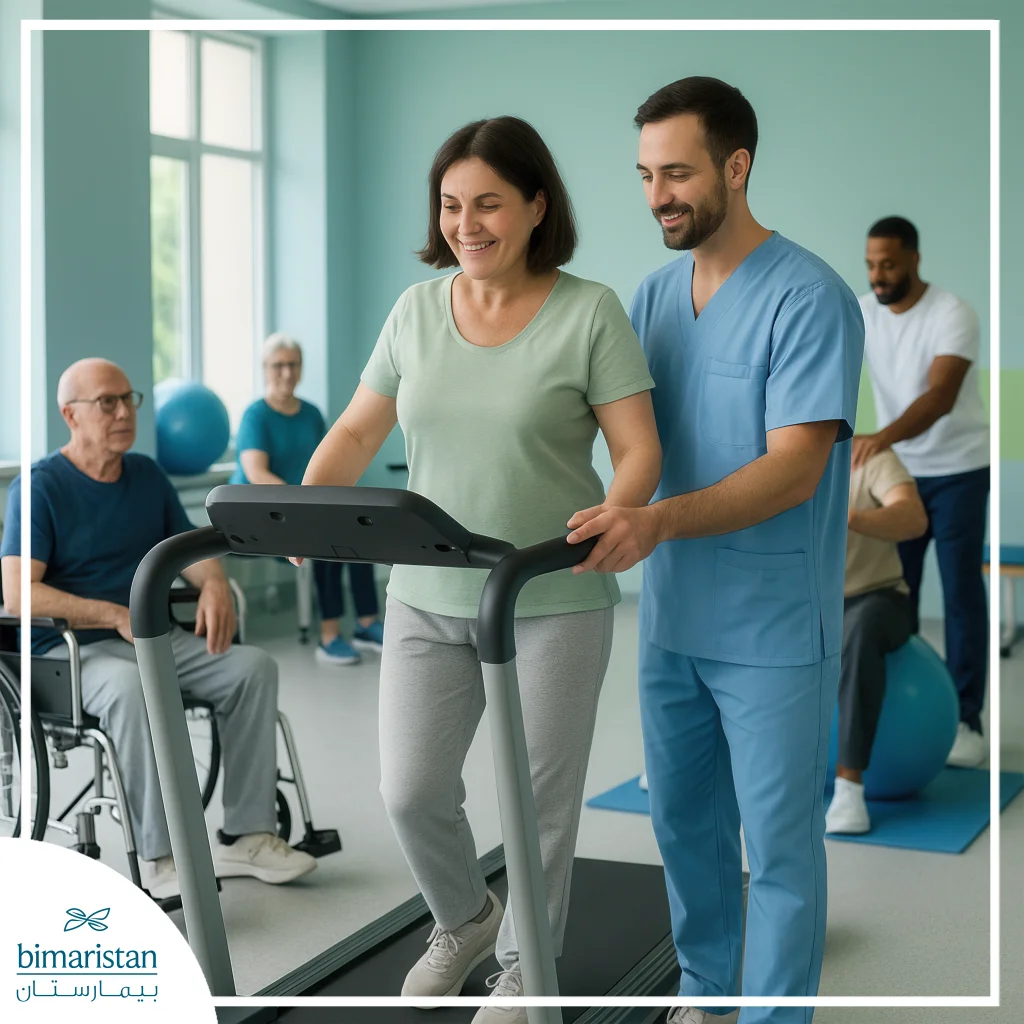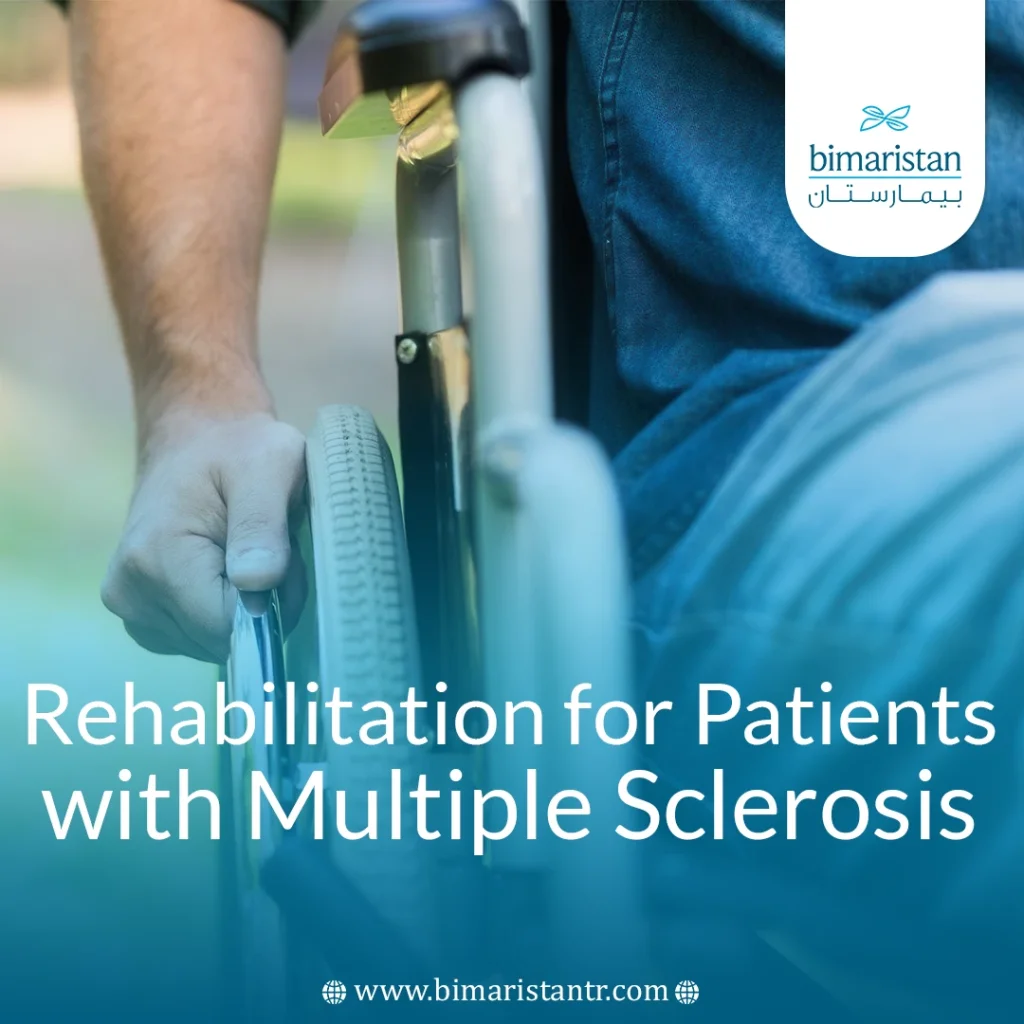Rehabilitation for patients with multiple sclerosis plays a crucial role in addressing the physical and psychological challenges associated with the disease. Since multiple sclerosis requires a comprehensive care approach, combining medical treatments with psychosocial support is essential for achieving optimal patient outcomes. In this article, we will explore the importance of rehabilitation for patients with multiple sclerosis and its significant impact on enhancing quality of life.
What is multiple sclerosis?
Multiple Sclerosis is a chronic disease that affects the central nervous system. In this disorder, the immune system attacks myelin, the protective coating of nerves. This disruption affects brain-body communication, leading to symptoms such as muscle weakness, numbness, vision impairments, and extreme fatigue. These symptoms vary widely, occurring intermittently or progressively as acute attacks or ongoing challenges. Multiple sclerosis is more prevalent in women and typically develops in adulthood.
Although there is no cure, Rehabilitation for patients with multiple sclerosis focuses on symptom management through medications that reduce attack frequency, physical therapy to enhance mobility, and psychological support to address emotional well-being. Since the condition requires long-term medical care, healthcare teams work to improve patients’ quality of life and help them adapt to changes associated with the disease.
The role of rehabilitation for patients with multiple sclerosis
Rehabilitation for patients with multiple sclerosis is a crucial process designed to enhance quality of life. It provides medical and psychosocial support, allowing patients to manage symptoms and challenges associated with the disease while improving their motor and psychological abilities. The significant role of Rehabilitation for patients with multiple sclerosis lies in:
- Improving quality of life: Rehabilitation for patients with multiple sclerosis is crucial in enhancing quality of life by alleviating symptoms such as fatigue and muscle weakness. Through physiotherapy and rehabilitation programs, patients gain improved mobility and the ability to perform daily activities more comfortably, leading to a more fulfilling life.
- Increasing independence: Rehabilitation for patients with multiple sclerosis also promotes independence through motor skills training and assistive technologies. These interventions help patients achieve independence, boost confidence, and minimize reliance on others, ultimately supporting their psychological well-being.
- Relieving psychological stress: Managing psychological stress is another key benefit of rehabilitation for patients with multiple sclerosis, as many patients experience anxiety and depression due to the challenges associated with the disease. Rehabilitation offers psychosocial support through counseling and therapy, enabling patients to develop effective strategies to overcome these emotional difficulties.
- Socialization promotion: rehabilitation for patients with multiple sclerosis encourages social interaction by providing opportunities for patients to connect with others facing similar challenges. Establishing a strong social support network positively impacts mental health and emotional stability.
- Personalized treatment: Rehabilitation programs are tailored to meet the needs of each individual patient, ensuring the best results. They include a comprehensive health and functional status assessment and then a treatment plan tailored to meet the patient’s goals.
Physiotherapy techniques for the rehabilitation of patients with multiple sclerosis
Rehabilitation for patients with multiple sclerosis relies heavily on physiotherapy, which plays a crucial role in enhancing mobility and improving quality of life. Through specific techniques, rehabilitation for patients with multiple sclerosis aims to achieve key goals that support mobility, overall health, and patient well-being.
Physiotherapy goals in the rehabilitation of patients with multiple sclerosis
- Improve strength and flexibility: rehabilitation for patients with multiple sclerosis focuses on strengthening muscles and improving flexibility through customized exercises. Resistance training and stretching help enhance mobility, reduce fatigue, and allow patients to perform daily activities more easily.
- Increase stamina: rehabilitation for patients with multiple sclerosis also aims to increase stamina, including physical therapy exercises that enhance overall physical capacity and boost energy levels, making everyday movements more efficient.
- Improve balance and walking with aids: it is an essential component of rehabilitation. Assistive devices such as crutches and walkers help facilitate safe mobility. Patients receive guidance on properly using these devices, minimizing the risk of falls. Balance exercises, such as standing on one foot or walking in a straight line, strengthen the body’s stability and coordination.
- Provide psychosocial support: Physiotherapy is important in providing psychosocial support to patients. Interaction with therapists and fellow patients promotes a sense of belonging, allowing individuals to share experiences and build emotional resilience.
- Customize therapy programs: each patient undergoes a comprehensive health assessment, followed by a tailored rehabilitation plan aligned with their personalized recovery goals.

The role of occupational therapy in improving daily independence
Occupational Therapy in rehabilitation for patients with multiple sclerosis is a crucial approach that helps individuals regain independence in daily activities. Through specialized strategies and techniques, occupational therapy aims to enhance quality of life, enabling patients to navigate their routines more easily and with confidence.
How does occupational therapy support daily activities for patients with multiple sclerosis?
- Daily skills training: Occupational therapy enables individuals to perform essential activities like bathing, dressing, and cooking more easily. Tailored strategies and techniques help patients carry out daily tasks more efficiently, enhancing their independence.
- Providing assistive tools: tools such as support handles and adaptive utensils reduce physical strain and offer the necessary support to boost patient confidence and independence in daily activities.
- Modification of the environment: Occupational therapy ensures a safe and accessible space at home or in the workplace. Adjustments such as bathroom grab bars or specialized seating help improve mobility and comfort, making patient movement easier.
- Developing coping strategies: occupational therapy helps patients break down complex tasks into smaller, manageable steps, preventing overwhelming feelings and ensuring effective completion of daily activities.
Speech and swallowing therapy in the rehabilitation of patients with multiple sclerosis
Rehabilitation for patients with multiple sclerosis includes speech and swallowing therapy as a crucial component, addressing challenges that impact communication and eating abilities. Many multiple sclerosis patients experience speech and swallowing difficulties, which can lead to additional health issues if left unmanaged, such as malnutrition or social isolation. Through specialized techniques, rehabilitation for patients with multiple sclerosis focuses on enhancing quality of life by developing effective strategies to overcome these obstacles.
Speech and Swallowing therapy in rehabilitation for patients with multiple sclerosis
- Exercises to improve speech: These exercises focus on strengthening the mouth and throat muscles. When enhancing these muscles, patients experience greater speech clarity, making communication easier. Techniques such as repetition and continuous practice can be used to improve speech and language confidence, helping individuals express themselves better.
- Strategies for swallowing: Patients are taught certain techniques to facilitate swallowing and minimize the risk of choking. Adjusting the head position while eating and adopting certain food textures, such as pureed foods or thick liquids, can help to ensure safety while eating.
- Alternative communication: In cases where patients have severe speech difficulties, alternative means of communication can be used. These include writing and using assistive communication devices, such as communication boards or voice applications, which enable patients to maintain effective interaction with others.

Rehabilitation for patients with multiple sclerosis includes psychosocial rehabilitation as a vital component of the treatment plan, significantly helping patients in managing psychological and social challenges related to the disease. Many individuals experience mood swings and depression, which require specialized interventions designed to enhance quality of life and strengthen their ability to adapt to the evolving changes through rehabilitation for patients with multiple sclerosis.
Managing mood swings and depression in the rehabilitation of patients with multiple sclerosis
- Psychological support: Psychological support provides patients with a safe environment where individuals can express their emotions and manage psychological challenges such as depression and anxiety. Through individual and group therapy sessions, patients have the opportunity to share experiences, learn coping techniques, and enhance their mental well-being with guidance from psychotherapists.
- Relaxation techniques: These techniques include meditation, yoga, and deep breathing, which are effective tools for reducing stress and anxiety levels. These practices promote emotional balance and calmness, enabling patients to face daily challenges more resiliently.
- Socialization: Socialization is a fundamental aspect of rehabilitation for patients with multiple sclerosis. It encourages patients to participate in social activities that help reduce isolation and strengthen social bonds. Building a support network improves emotional well-being and overall quality of life.

When should rehabilitation for patients with multiple sclerosis begin after diagnosis?
Rehabilitation for patients with multiple sclerosis should begin as early as possible. The earlier treatment is started, the better the chances of improving symptoms and minimizing the impact of the disease on daily life. Starting rehabilitation at an early stage enhances treatment effectiveness, improving mobility and overall quality of life for patients. Regular patient evaluations are essential in rehabilitation for patients with multiple sclerosis to update the treatment plan based on progress and changing needs. Continuous assessment ensures that rehabilitation goals align with the patient’s evolving condition, guaranteeing adequate and personalized care throughout the process.
The role of the family and the medical team in the rehabilitation of patients with multiple sclerosis
Rehabilitation for patients with multiple sclerosis is a comprehensive process that relies on family and medical team collaboration, ensuring the best support system to enhance quality of life. This inclusive approach strengthens treatment effectiveness and helps patients adapt to the daily challenges of multiple sclerosis. So its significance lies in:
- Emotional support: The family provides the necessary emotional support to patients, which contributes significantly to improving their psychological state. This support can enhance the patient’s ability to face challenges, making it easier for them to express their feelings and deal with the psychological pressures that may arise as a result of the disease.
- Collaboration with the medical team: Collaboration with the medical team, which includes a range of specialists, is part of the rehabilitation for patients with multiple sclerosis. Regular assessments by the medical team allow for necessary updates to the treatment plan based on the patient’s needs. This integrated approach ensures individuals receive appropriate care and support, contributing to symptom management and an overall improvement in quality of life.
Rehabilitation for patients with multiple sclerosis highlights the critical role of collaboration between family and the medical team in enhancing the effectiveness of the rehabilitation plan. Through comprehensive support, patients can overcome the challenges of multiple sclerosis while enhancing both motor and psychological abilities, ultimately achieving greater independence in their daily lives. Early initiation of rehabilitation for patients with multiple sclerosis is a key factor in improving quality of life and mental health, ensuring better symptom management, and overall well-being.
Sources:
